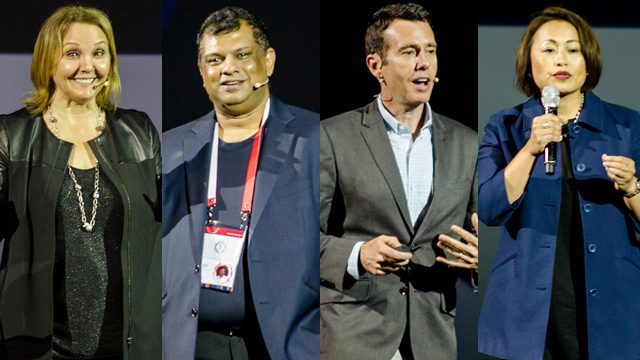SUMMARY
This is AI generated summarization, which may have errors. For context, always refer to the full article.

MANILA, Philippines – The Asia-Pacific Economic Cooperation (APEC) capped off a year’s worth of focusing on policies to support micro, small, and medium enterprises (MSMEs) with a summit designed to tackle some of the current trends that can inspire entrepreneurs.
The summit entitled “Innovation and Big Ideas: Pushing boundaries” was held on Tuesday, November 17, a day ahead of the center piece meeting to be attended by APEC economy leaders.
Promoting MSMEs has been a central feature of the country’s APEC hosting this year, which revolved around the theme of inclusive and sustainable growth.
These small businesses, which make up 99.7% of APEC economies, have been identified by the APEC Business Advisory Council (ABAC) as key to tapping into inclusive growth.
“Unlocking the remarkable potential of entrepreneurs needs robust innovation ecosystems. MSMEs are oftentimes better poised to understand new customer expectations and create transformational business models through innovation,” said ABAC 2015 chairperson Doris Magsaysay-Ho, 2015.
Here are some of the ideas discussed at the summit.
Asia as innovation hub
“Between 2010 and 2025, 440 cities around the world will generate half of global gross domestic product (GDP) growth, “ said Asia Society CEO and founder Josette Sheeran.
Many of these cities are those that most people have not heard of – such as Surat in India, Porto Alegre in Brazil, and Boshan in China, she added.
Another interesting fact she shared was that in 2014, research firm AT Kearney did a study on the next global center of innovation in the world and which found that Jakarta in Indonesia came in first, while Manila was second.
What this means, she explained, is that opportunity is coming in ways that one could not have felt or predicted in the past.
“Manila now has ability to change the way the world does business through dealing with its own problems,” she said, and “the world is paying attention.”
Sharing economy, creating opportunities
“The sharing economy is not a problem to be managed but an opportunity to be seized to see what we can build with it,“ said David Plouffe, Uber senior adviser and board member.
It is not only because platforms now allow individuals to profit from them by being an Uber driver or renting an apartment out on Airbnb. These platforms are also fundamentally reorganizing economies.
Services like Uber give people power to create their own income and create their own schedules. Right now, it is mostly for temporary periods but eventually it will reshape the way people think of work, transport, and other things, Plouffe said
Because of the emergence of these new sharing platforms, governments will have to find a way to make more regulations more dynamic.
Plouffle shared that upon entering office, US President Barack Obama ordered a regulatory review of US government agencies, the first initiated in decades, to illustrate the fact that government tends to lag behind innovation.
Caring: An economic imperative
“In the US alone, $280 billion (P13.2 trillion) is spent on child care. It’s often the most expensive item for dual income households in the United States, more than college, mortgages, and transportation,” said Sheila Marcelo.
Marcelo is the founder of Care.com, a website that helps families find care for children, the elderly, or the sick.
Care is often seen as a “soft issue,” she explained, but it has a fundamental importance in society that will create far reaching benefits.
“Studies show that a country’s GDP would increase with equal female participation in the workplace. In the US alone by 9%, 13% in the EU, and a full 16% in Japan,” she said.
Staying at home to care for children, seen in most parts of the world as traditionally a women’s role, is the biggest limitation to women’s participation in the workplace, she added.
“Women now are increasingly opting out. Deciding not to get married and have children. In Taiwan, the rate is now 1 out of 3 women, in Japan 1 out 5,” Marcelo pointed out.
It affects supply because they are the primary source of caregivers, she said, adding that the solution is that care services must scale and transcend borders as there is a global demand for it.
People are the biggest assets
“To all SMEs out here, don’t let anyone tell you you can’t do anything. Business is business,” said AirAsia founder Tony Fernandes, who said that he started the budget airline with zero experience in the aviation industry.
For him, the core concepts of branding and people is a far more valuable commodity.
AirAsia has no worker unions partly because of the general contentment of its staff, which he took pains to create, he said. He went to the extent of doing the airline’s lowest level jobs temporarily to get to know the work and workers.
This was crucial in fostering a flat organizational structure, he said, which allows for effective decision-making as employees are not intimidated.
Fernandes captured the entrepreneurial spirit of the summit with a summary of his primary role as being one “to turn rough diamonds into polished ones.” – Rappler.com
$1 = P47.17
Add a comment
How does this make you feel?
There are no comments yet. Add your comment to start the conversation.